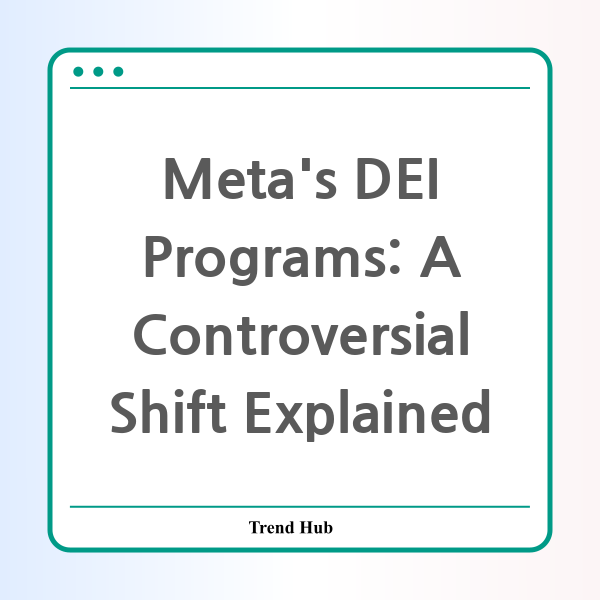* This website participates in the Amazon Affiliate Program and earns from qualifying purchases.

In a bold move that has ignited considerable discussion, Meta, the parent company of Facebook and Instagram, has announced the termination of its Diversity, Equity, and Inclusion (DEI) programs. This decision marks a significant shift in the company's approach to hiring and internal training, raising questions about the future of diversity initiatives in one of the world’s largest tech companies.
The memo, circulated by Janelle Gale, Meta’s Vice President of Human Resources, outlines key changes to the DEI strategy that the company has implemented. These changes include the discontinuation of the "Diverse Slate Approach," which previously prioritized diverse candidates in hiring processes, and the ending of equity and inclusion training programs.
### What Are the Major Changes?
In the announcement, five notable DEI pullbacks were highlighted:
- Disbanding the DEI Team: Meta will no longer maintain a dedicated team focused solely on diversity initiatives.
- Ending Equity and Inclusion Programs: The programs designed to promote a more equitable workplace are being phased out.
- Sunsetting Supplier Diversity Efforts: The company is halting its initiatives focused on increasing supplier diversity.
- Eliminating the "Diverse Slate Approach": This approach of considering various qualified candidates from underrepresented groups for open roles will no longer be in practice.
- Ending Representation Goals: The previously set goals for hiring women and ethnic minorities are being dismissed.
Meta's Chief Diversity Officer, Maxine Williams, will shift her focus to a new role aimed at enhancing accessibility and engagement, a move that indicates a broader strategy to embrace inclusivity from a different angle.
### Why the Shift?
The announcement comes at a time when the legal and policy landscape surrounding DEI initiatives in the United States is shifting. Recent court rulings have signaled a more critical perspective on diversity-related hiring practices. Meta’s leadership has indicated that these changes are essential to adapt to the evolving environment.
In the memo, the company reiterated its commitment to serve everyone by stating the importance of drawing upon a diverse range of experiences and perspectives. The focus will now shift to building a workforce that encompasses a wide array of skills and backgrounds without specifically targeting diversity in hiring as a formal goal.
### Reactions from Employees
The response from Meta employees has been mixed. Many have expressed disappointment and concern over the termination of DEI programs, viewing these initiatives as critical to fostering an inclusive workplace culture. Some employees took to Meta’s internal communication platforms to voice their criticisms, highlighting the potential impact that such a shift could have on workplace diversity.
### Looking Forward: What This Means for Diversity in Tech
Meta’s decision is a reflection of a broader trend in the tech industry, as companies navigate the complexities of political and social expectations. As organizations like Meta reassess their DEI approaches, the future of diversity efforts across the technology sector may be at a crossroads.
The implications of these changes extend beyond Meta itself and may influence how other companies in the industry proceed with their diversity initiatives. As businesses face mounting pressure to align with political sentiments, it remains to be seen whether this shift will lead to more inclusive practices or inadvertently foster environments that overlook diverse talent.
In conclusion, while Meta’s shift away from its DEI programs may be framed as a necessary adaptation to external pressures, it raises critical questions about the role of diversity in the workplace. As the company navigates this new terrain, stakeholders will be closely watching its impact on employee morale, recruitment, and the company’s overall culture.
As discussions surrounding diversity and inclusion continue to evolve, it is crucial for companies to rethink their strategies and ensure they are building environments that truly value diverse voices and perspectives.
* This website participates in the Amazon Affiliate Program and earns from qualifying purchases.